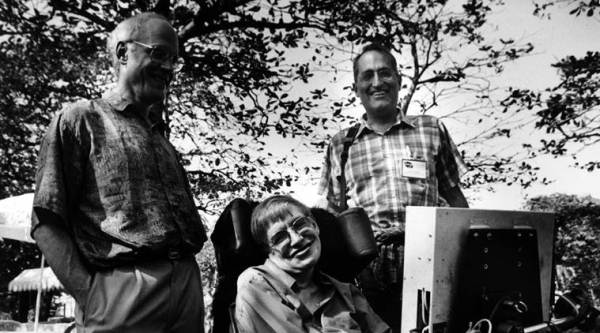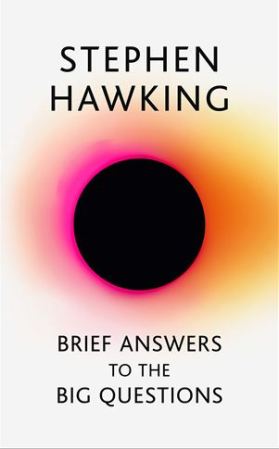A singular mind
Exploring the remarkable life and work of physicist Stephen Hawking who dared to look upon the universe

David Gross, Stephen Hawking and Edward Witten at the String 2001 international conference, held at the Tata Institute of Fundamental Research. (Express Archive Photo/Manoj Patil)
Title: Brief Answers to the Big Questions
Author: Stephen Hawking
Publisher: John Murray
Pages: 232
Price: Rs 650
Author: Stephen Hawking
Publisher: John Murray
Pages: 232
Price: Rs 650
“I have led an extraordinary life on this planet, while at the same time travelling across the universe by using my mind and the laws of physics,” writes Stephen Hawking in his last book, Brief Answers to the Big Questions. “I have been to the furthest reaches of the galaxy, travelled into a black hole and gone back to the beginning of time.”
Hawking’s family and associates have organised one last hurrah this week, in memory of one of the greatest minds in the history of theoretical physics and cosmology. Christie’s has announced that it will auction his wheelchair, an essential part of his public image, along with one of the five surviving copies of his 1965 PhD thesis, signed in a hand that was already shaky because of motor neuron disease. His last paper, completed just before his death in March, has been published on the preprint journal ArXiv. And the last collection of his essays for the lay reader, which he had begun before his death, is out. “This is almost a response to the response to A Brief History of Time,” said his daughter Lucy Hawking.

Hawking’s last paper continues the work that brought him fame, an attempt to reconcile the laws governing black holes with the laws of quantum physics. Inside a black hole, matter becomes superdense, time stops and the laws of physics fail at what is known as the singularity. The particular problem that interested Hawking all his life was the black hole information paradox: when black holes wink out, information is lost to the universe, violating a principle of quantum mechanics.
But lay people are generally more interested in worldly matters, rather than black holes. They would like to know if God exists, if the universe will suddenly collapse, or if global warming will compete with human stupidity — which is always in endless supply — and wipe them out first. There are also questions actuated by curiosity rather than anxiety: why is the universe three dimensional? Why not 10 (which is what string theory supports)? And is there life on other worlds? The questions are related, Hawking shows. Many chapters end on a hortatory note. The first, titled ‘Why We must Ask the Big Questions’, ends with: “Be brave, be curious, be determined, overcome the odds. It can be done.” The very last, titled ‘How do We Shape the Future’, ends with: “So remember to look up at the stars and not down at your feet.”
Those are general instructions for the fulfilling life. But other questions are specific, like this chapter title: ‘Is there a God?’ For a physicist, that’s easily answered. Time did not exist before the Big Bang, so there was no time for a creator to get things going. Believers would, of course, argue that He or She exists outside the constraints of space and time, and could bloody well do as they pleased. Their conviction would be less robust than before, since science is answering more and more of the questions in which religion used to claim exclusive domain expertise.
Hawking provides a reasonable answer to another question, on which dystopian science fiction has claimed theatre dominance — the possibility of artificial intelligence creating another singularity, on earth rather than in a black hole — by developing knowledge at a rate which humans can no longer comprehend. He writes of a time when “there would be ten papers a second in my kind of theoretical physics.” The dystopian view is that at such a time, machines will be more intelligent and evolving faster than humans, and Darwinian survival of the fittest would seal our doom.
The weakness of this Terminator-like scenario, a staple of science fiction, is that it makes no clear distinction between the development of intelligence, of personality and of free will. Being more intelligent than humans need not be a sufficient reason to persecute the human race. Hawking reduces this dystopia to a design issue. It can be avoided if, before machines reach the singularity, humans programme them against producing progeny that act arbitrarily or against human interests. This is important because autonomous, self-replicating spacecraft are better candidates than humans for exploring deep space. And we have seen it already: earlier this year, Facebook’s bargaining bots were shut down because they had developed a pidgin, which they processed faster than English. It was a design flaw; the programmers had not included an incentive for using English.
This is a book of answers, but the scientific community will not remember Hawking as the solutions guy. In his eulogy at the interment ceremony for Hawking’s ashes at Westminster Abbey, Kip S Thorne said: “Newton gave us the answers. Hawking gave us questions.” Thorne answered one of those questions in 2015, when his Laser Interferometer Gravitational Wave Observatory (LIGO) picked up the chirp of a gravitational wave passing through the earth. It was the signature of the collision of two black holes 1.3 billion light years away, and it won him the Nobel Prize. Who knows how many more honours remain to be won, for answering the questions raised by Stephen Hawking?










.png)











No hay comentarios:
Publicar un comentario